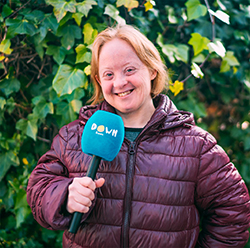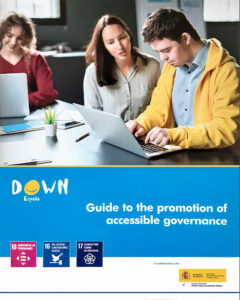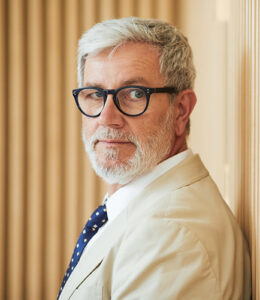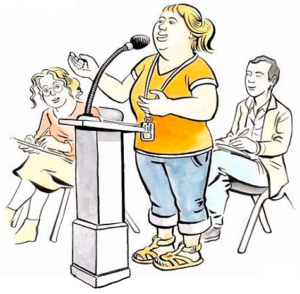28 Oktober 2023 in Madrid
A full day seminar took place on Saturday 28 October. As always, the AGA is combined with a conference around a specific theme. This year the topic was: Self-Advocacy.
1. State of the art about Self-Advocacy in Europe
To introduce the topic José showed the results of a small survey among EDSA members and members of Down España: State of the art about Self-Advocacy.
Although most associations are aware that Self-Advocacy is an important issue, there was a lack of implementation almost everywhere. Only a few associations have people with Down syndrome on their boards, only a few associations regularly discuss projects, activities with young adults or listen to their ideas and suggestions.
With mentimeter José gathered answers from all attendees on following questions: What should be the way in the strategy of your organisation in participation; What should be the level of participation of people with DS in this strategy?; What would be the ideal situation of Self-Advocacy? How is the reality?
Conclusion: there is still a long way to go to reach the ideal situation!
José handed out a new publication of Down España: Guide to the promotion of accessible governance
2. WDSD 2023 poster campaign “With Us Not For Us“
Cora said some words to the poster campaign of the last WDSD. The theme was „With Us Not For Us“ and thus deals with the same topic as the Self-Advocacy seminar. Even though it was initially difficult to find examples – very few of the EDSA member associations had any indication on their websites that people with DS are on their board or that for example they co-operate closely with them in an advisory board. But then there were an astonishing 24 contributions and so it turned out that something is happening here and there in the direction of Self-Advocacy, but still far too little!
All posters were presented again and Cora explained what was shown in the pictures.
3. Initiatives of Down España in the field of inclusive governance and self-advocacy
The main speaker of the seminar was Prof. Pep Ruf i Aixàs. He is a Pedagogue and the Coordinator of the Independent Living Network of Down España, technical director in the Foundation Catalan Syndrome de Down (fcsd) as well as Professor of social education at University of Barcelona (UB) and Universitat Oberta of Catalunya (UOC).
He introduced the National Network of Independent Living. His presentation gives a good overview of the proposals, the objectives of services of the network.
Some interesting issues Pep Ruf talked about:
– promoting self determination
Many people with DS are not aware of their rights, are not aware that they have the right to make own decisions. Neither do they know that they have also collected rights, as part of a group, of society.They live with parents, because they cannot change the situation, they are suffering of social exclusion. We have to teach them about their rights, we have to promote self-determination.
– Improving the quality of life
To have a lot of practical skills, to have autonomy is not a measure of independent living or of quality of life. We have personal assistance to overcome certain problems here. The real measure is the quality of life of the person, that means how far is he on the way to real independent living? It means much more as just practical skills.
– the different services, offered by the network like training courses, learning homes, shared housing, personal support services, self advocacy groups and inclusive leisure services
– His opinion about housing
housing groups are artificial groups. It is not what the person chooses himself! Housing projects are run by organisations, paid by organisations. It is not the person with DS who pays, decides. Inclusive projects where for example students and people with ID/DS live together are also artificial. This is not real independent living.
The natural situation is: People with DS choose for themselves whether they want to live alone or with a friend. All that is needed is suitable accommodation, assistance and money. A place in a residential facility costs the state around 3000 euros. This is more than enough to pay for a personalised solution.
In Catalonia, the region where Prof Ruf works there are about 1500 persons with ID/DS living on their own, alone. Most of them prefer to live by themselves, also because they have no such close friends they want to live with. Normally they get 10 hours weekly personal assistance, which is sufficient for most of them.
– cognitive assistance – an interesting term – this is the kind of assistance that most of our people with DS need, someone who explains situations, changes, mediate in difficult situations, planing, coaching and giving support in making decisions.
– Inclusive leisure services are important as well, then leisure time is more as just going out for a walk, to a shop or in the cinema. It also means being part of the community.
– Pep Ruf gave a definition of Accessible Governance and the strategies to promote this. There is a lot of work ahead! The latest publications of Down España deals with this issue and is called the „Guide to the promotion of accessible governance“. To make participation in governing bodies successful a lot of changes and adaptations are necessary.
At the end of his speech stood the final remark of Pep Ruf: We have to move from organisations for people with Down syndrome to organisations of people with Down syndrome!
There were many questions to Pep Ruf and the interesting discussion could have gone on for a long time but we had to stick to the time schedule, as the next presenters were waiting.
4. Self-Advocates formation of Trisomie 21 France
Nathanaël Raballand of Trisomie21 France together with his son Melchior (with DS) and Marie Laure…. had prepared a presentation about the Self-Advocates formation of his organisation. At the same time there wer two young adults from France connected online: Fanny, Antoine (and Vincent but connection did not function) There was an interesting talk, with all about what it means to be a self advocate, how they were trained to be a self advocate. Melchior asked questions and Fanny and Antoine answered.
Two videos showed how the training to learn to be a self advocate is organised. Some of them become then trainers themselves and teach the next persons with DS so that they all learn how to make their voice heard. In many cities in France there have been such trainings.
5. “Reporteros Cañeros“ of Down España
After lunch José had invited a young lady Cristina, who works at Down España in different department since 18 years. In an interview with José she explained her role in Down España. She is also one of the „Reporteros Cañeros“, wich means that she prepares questions to a certain current topic and then goes out in the street or in a shopping mall with her microphone and interviews passers-by. This can be seen life on a special TV-Channel. Christina has a humorous way of talking about her work. It was very nice to listen to her.
Some of the interviews were shown in a video. Besides Christina there is a young man with DS who also works as a reporter. https://youtube.com/playlist?list=PLtNX3F-LGSoUxyBAzc-6rDjWgRZmCtpIE
6. Self-Advocacy program “My Voice My Society“ of Türkiye Down syndrome Association
Another contribution to self-advocacy came from the Türkiye Down syndrome Association. Fulya showed a good structured, informative presentation about the program ”My Voice My Society“, which started 2017. One objective is empowering people with intellectual disabilities as citizens. And the second objective is empowering people who will guide people with intellectual disabilities as a facilitators. The first self-advocate group called themselves Voice + 1 and has been very active right from the start.
Türkiye Down Syndrome Association is co-founder of a Network for the Rights of Children with Disabilities. They have trained facilitators in 17 NGO’s in the network. 12 NGO’s established their self-advocacy groups u.a. with children and youngsters with different disabilities.
Self Advocates achieve:
- They know and are aware about rights and asking for them.
- They develop self-confidence.
- They learn that their views are valued.
- Behaviour problems decrease.
It is not only about learning rights it is also about accepting oneself as a valuable person and realising one’s value to the world.
7.–11. Five contributions were short videos from different associations
– First we saw a film about the my voice self advocate group of DSA (Down syndrome Association from the UK), which shows the activities of this group.
– The video from Romania of Aldo Cet gives information about an EU project „Sustainable Service in DS“. It promotes an active model of people’s involvement into the global call for action based on the quality of life model instead of the assistive model which is currently used in educational and social environments for people with Down syndrome. In 2 further short films some activities from the project were shown, already during the AGA.
– DownSideUp from Moscow send a video about two young people with DS explaining how a good early intervention pays off. That’s how they got a good start in life as adults and it helped them to become independent.
– The contribution from AIPD in Italy, was a video made for the WDSD 2023 about the rights of people with DS: the right to vote, to have a job, to fall in love, to choose a boy/girlfriend, to choose where and with whom to live! For this occasion a dance was trained by many DS groups all over Italy and was shown on the streets in many cities on 21 March (Tutti in Piazza)
– DS Ireland sent a short statement of a young woman with DS about self advocacy.
12. Contribution from Sweden
Veronica Hallberg explained that even though they had tried to integrate a person with DS in the board of the Swedish DS association, they failed. It just did not function. She was very sad about this but other attendees mentioned that they had the same experience.
The discussion went about what to do, to make such a cooperation with persons with DS successful?
One answer is: they should be well prepared for this task. It is hard work for us to teach them about this role.
13. Contribution from Portugal
Pais 21 Portugal presented their organisation, their vision and mission, values and projects. One of the projects is Autonomia 21 with the goal to find an occupation of the 18+ years old young adults who finished school. More self determation, going academic learning, possibility to try new things. The program Saber em Movimento started with 6 youngsters September 2022 with internships etc.
And was successful – several young adults found jobs after the training time.
All in all, it was a very enjoyable and instructive day. The participants were satisfied with the many interesting contributions and will certainly take some ideas and suggestions home with them.




